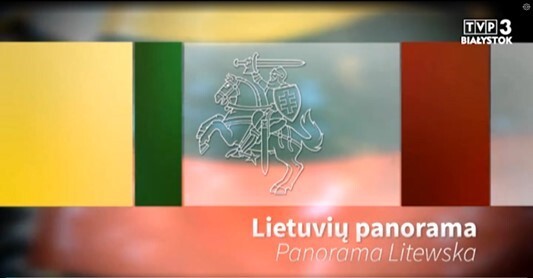-
-
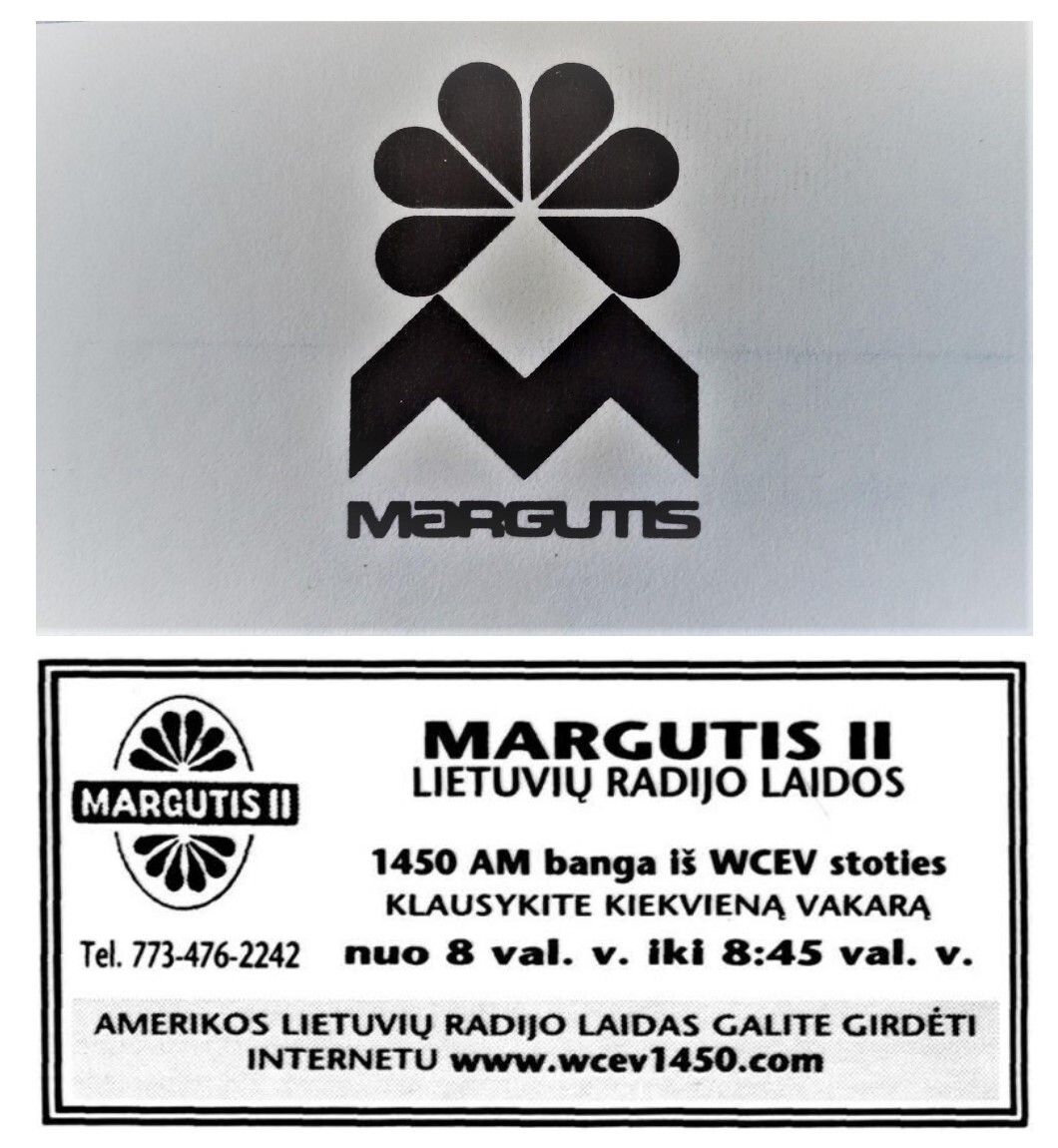
The “Margutis” logo from earlier times. Below, an ad in "Friend" for “Margutis II”, June 27, 2007
“Margutis” – Chicago, USA
With the largest proportion of the Lithuanian diaspora being in USA, radio broadcasting was a popular form of communication. There were Lithuanian communities in Arkansas, New York, New Jersey, Pennsylvania, and Connecticut, and in Chicago, Los Angeles, Baltimore, Boston, Detroit and Cleveland. When Lithuanian independence was restored, these centres remained active, but with time broadcasting in the smaller communities disappeared. Currently there are radio programs in Chicago, New York, Detroit, Cleveland, Hartford and Los Angeles.
One of the best-known radio programs in the US was “Margutis”, which began on April 11, 1932, and continued, with only a few breaks, for nearly 80 years. Several generations of immigrants listened in Chicago and its environs. During the struggle for independence, “Margutis” was the main source of information in Chicago, transmitting the latest relevant news and interviews as well as invitations to political protests.
After a period of intense activity in the early days of Lithuanian independence, “Margutis” encountered financial difficulties in 1995 and was discontinued. On September 25 of the same year Valdas Adamkus launched “Margutis II”, registered as a non-profit organization, with daily 45-minute programming heard throughout the Chicago area and online.
Founding members joined the new “Margutis II”, headed by Leonas Narbutis (1995-1996 m.), and then Rytis Januška (1996-1999 m.). In 1999, an editorial board was established. Fund-raising was tasked to a committee headed by Marija Remienė. A wide group of Lithuanians contributed to the program over the years, including Bronius Tomas Dirmeikis, Vladas Vijeikis, Vytautas Kasniūnas, Jonas Šoliūnas, Romas Sakadolskis, Emilija Sakadolskienė, Algis and Audrius Regis, Mykolas Jurgis Drunga, Raimundas Lapas, Dalia Sokienė, Eglė Juodvalkė and others.
“Margutis” persevered throughout various pitfalls and several generations of the diaspora, but was unable to withstand the challenges of globalization, and transmission was discontinued on January 31, 2011. A farewell to listeners was written by M. Remienė in Friend at that time.
Listen to “Margutis” and “Margutis II” programs here.
“Margutis” always provided music and entertainment. The Lithuanian National Martynas Mažvydas Library collection contains a number of its audio files. A few examples.
Photos. -
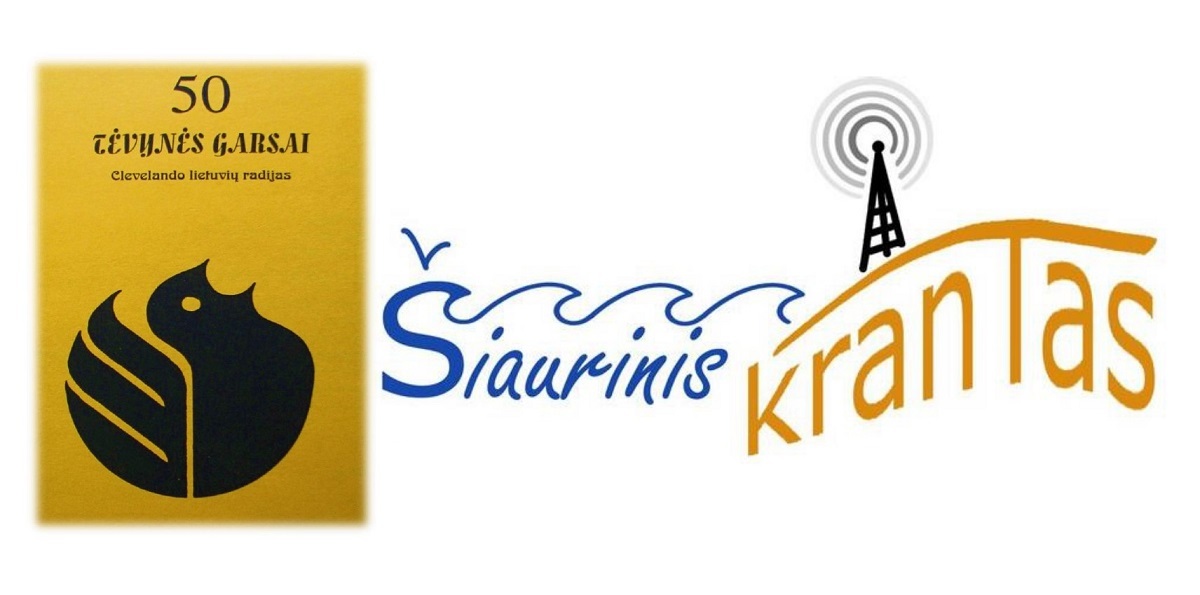
Examples of the radio program logos: at left, the “Sounds of the Fatherland” logo (1999), at right – the “North Shore” logo, 2020
Cleveland Lithuanian Radio
Cleveland was always a stronghold of Lithuanian radio. The best-known program, “Sounds of the Fatherland”, was begun by Jaunutis Nasvytis in 1949. It blossomed in 1958, in the hands of Juozas Stempužis, who added a morning program, a Sunday program, and “Bells of Life”, and brought the Baltic Echoes group under the same umbrella. J. Stempužis was an active member of the Lithuanian community, created programming in English and broadcasting it elsewhere in the US. After he died in 1992 his wife Aldona took over, later joined by her son, with assistance from quite a number of Cleveland Lithuanians. The timing and number of broadcasts varied, but over the final few decades it was a Sunday morning fixture at 8 o’clock, with programming between 90 and 120 minutes in length. The family continued the program until May, 2010. The introduction to the program can be heard here. In this December 21, 2008, broadcast you can hear announcers Aldona Stempužienė, Živilė Vaitkienė, sound engineer and English announcer Greg Priddy.
The Cleveland experience is unusual in that once the “Sounds of the Fatherland” program ended, it was succeeded by representatives of the third wave of immigrants. The same university radio station WJCU-FM now broadcasts the “North Shore” at the same time, 8 o’clock on Sunday mornings, often called simply “Lithuanian Radio”. The program is two hours long, headed by Marius Juodišius, with the help of Augis Dicevičius, Regina Ona McCarthy, and Tadas Bartkus. You can listen to this program on its website, where the complete collection of “North Shore” broadcasts since 2010 is archived. -
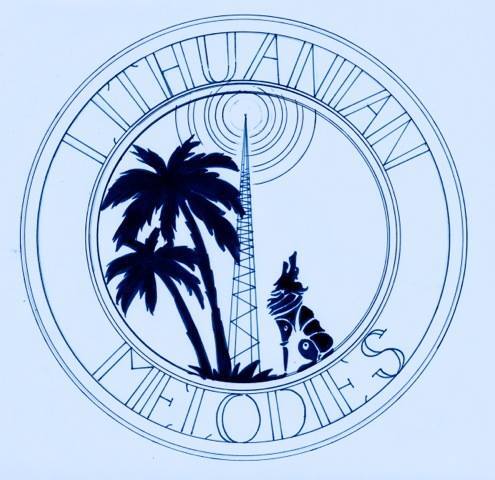
Logo of “Lithuanian Melodies”
“Lithuanian Melodies” in California
“Lithuanian Melodies”, broadcast by the California Lithuanian Radio Club in Los Angeles, is an exceptional example of this form of media adapting to changing times.
The origins of Lithuanian radio in California are rooted in the first program broadcast in the region, called “Lithuanian Melody Hour”, by Bruno Gediminas in 1952. The leadership and current version of the program took shape with birth of the California Lithuanian Radio Club, sometimes still called the Lithuanian Melodies Club. The first program was broadcast on February 16, 1969 on KTYM radio, and continues today. An article in Friend told the story on June 2, 2007 (pages 10-11).
The California Lithuanian Radio Club maintains the program and organizes its funding, with a great many California Lithuanians assisting in the work over the years. At this time the website lists Regina Gasparonienė, Lina Kajotienė, Gražina Grinkevičienė and others, who work in the background.
The club continues to maintain and broadcast “Lithuanian Melodies”, with staff who are active in social media. The broadcast can be heard every Saturday at 12:30 PM on radio KALI, 900 AM from Pasadena, and it is also streamed online. -
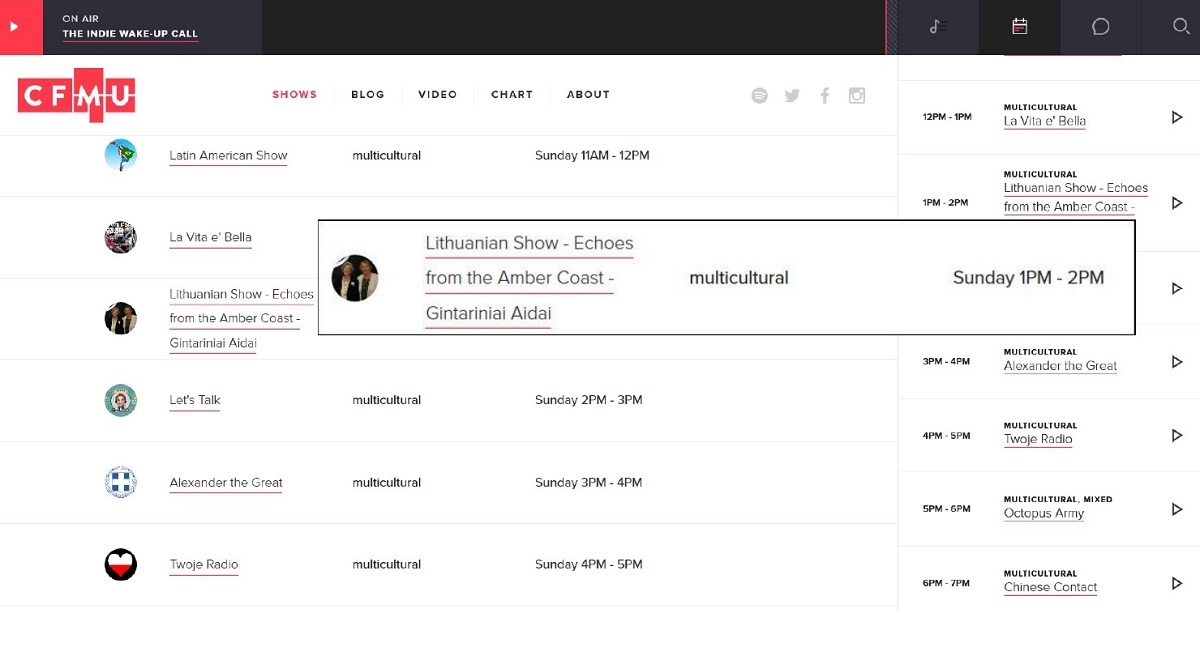
A description of “Echoes from the Amber Coast” in the radio station’s program. A sample of the radio station program.
“Echoes from the Amber Coast” - Canada
The Lithuanian Community in Canada had several radio shows, but only one still continues today – “Echoes from the Amber Coast” in Hamilton.
Beginning on January 13, 1978, the program has continued without interruption for more than 42 years. Created by McMaster University student Edvardas Stungevičius (Stavin), he was assisted by other students, such as Aušra Pleinys, Dalia Pajarskas-Peddle, Ed Labuckas and Antanas Rašymas. Liuda Stungevičius, one of the current hosts, joined the team in 1984 and was later assisted by Dana Enskaitis, Andrius Gedris, Rev. Juvenalis Liauba, Viktoras and Aldona Remesat and others. Since 2006, the host is Amalija Gedris, and E. Stungevičius continues as coordinator.
“Echoes from the Amber Coast” broadcasts every Sunday from 1 to 2 PM on the McMaster University radio station CFMU, 93.3 FM. The program has survived the years. It is available on the station’s website and it is also partially archived here.
A radio program existed in Montreal, at CFMB Radio Montreal, 1280AM. “The Montreal Lithuanian Program” was on from 11 PM to 12 midnight, beginning on September 6, 1968, hosted by Liudas Stankevičius (Louis Stanké). It continued broadcasting after 1990 as well, but no further news about it is available. The last references to it were found in 2015, possibly on the same station -
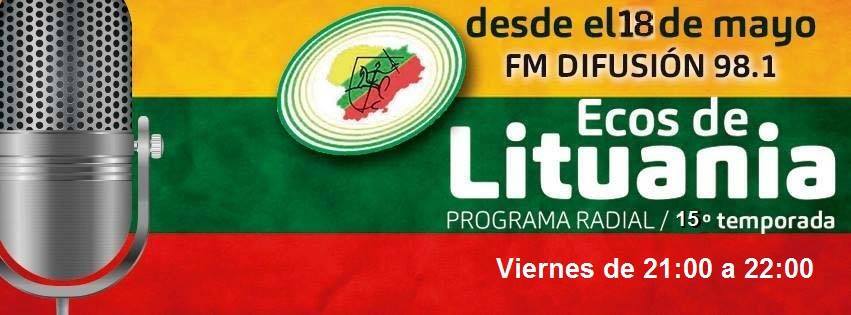
“Echoes of Lithuania” – the final program of its 15th season, 2018
“Echoes of Lithuania” - Argentina
The Argentinian Lithuanian radio program “Echoes of Lithuania” (Ecos de Lituania), started in 1947, was at first meant to entertain and inform, but with time became an essential element of Argentinian Lithuanian cultural and social life. However in 1972, due to internal disputes and lack of funding, the program went off the air. The current “Echoes of Lithuania” was renewed in 2003 by a member of the Argentinian Lithuanian Community Board, Juan Ignacio Fourment Kalvelis. Over several decades of its silence, both radio and listeners had changed, and it was essential to present news and make Lithuania relevant to Lithuanians.
The “Echoes of Lithuania” program was broadcast from the city of Berisso twice every week – Fridays from 9 to 10 PM and repeated on Sundays from 7 to 8 PM. Due to the pandemic, programming has been suspended at this time, and will resume in spring, 2021, once again presenting news from South American Lithuanian communities, their activities as well as information about Lithuania, its history, culture, geography, sports and citizenship issues.
Over 15 years of broadcasting, the program has gathered a team of more than 20, including Juan Ignacio Kalvelis, and his parents Isabel Kalvelis and, Juan José Fourment. Their goal has been to preserve and promote Lithuanian identity, culture and traditions, and to spread the word about Lithuanians in South America, to attract young people to the Lithuanian communities in the diaspora. The program is unique in that it is broadcast in Spanish, because most listeners no longer understand Lithuanian. Spanish is also used so that this interesting program may reach the widest possible group of listeners, and introduce them to Lithuanian culture. With a lack of periodicals in the region, radio programs have become essential for disseminating information and cultural news in South America. The program is on Facebook and YouTube. You are invited to view the “Echoes of Lithuania” studio.
The program is included in local heritage listings, and has been honoured with nominations and a variety of awards for preserving Lithuanian culture in South America. More information in Lithuanian is available in this article. -
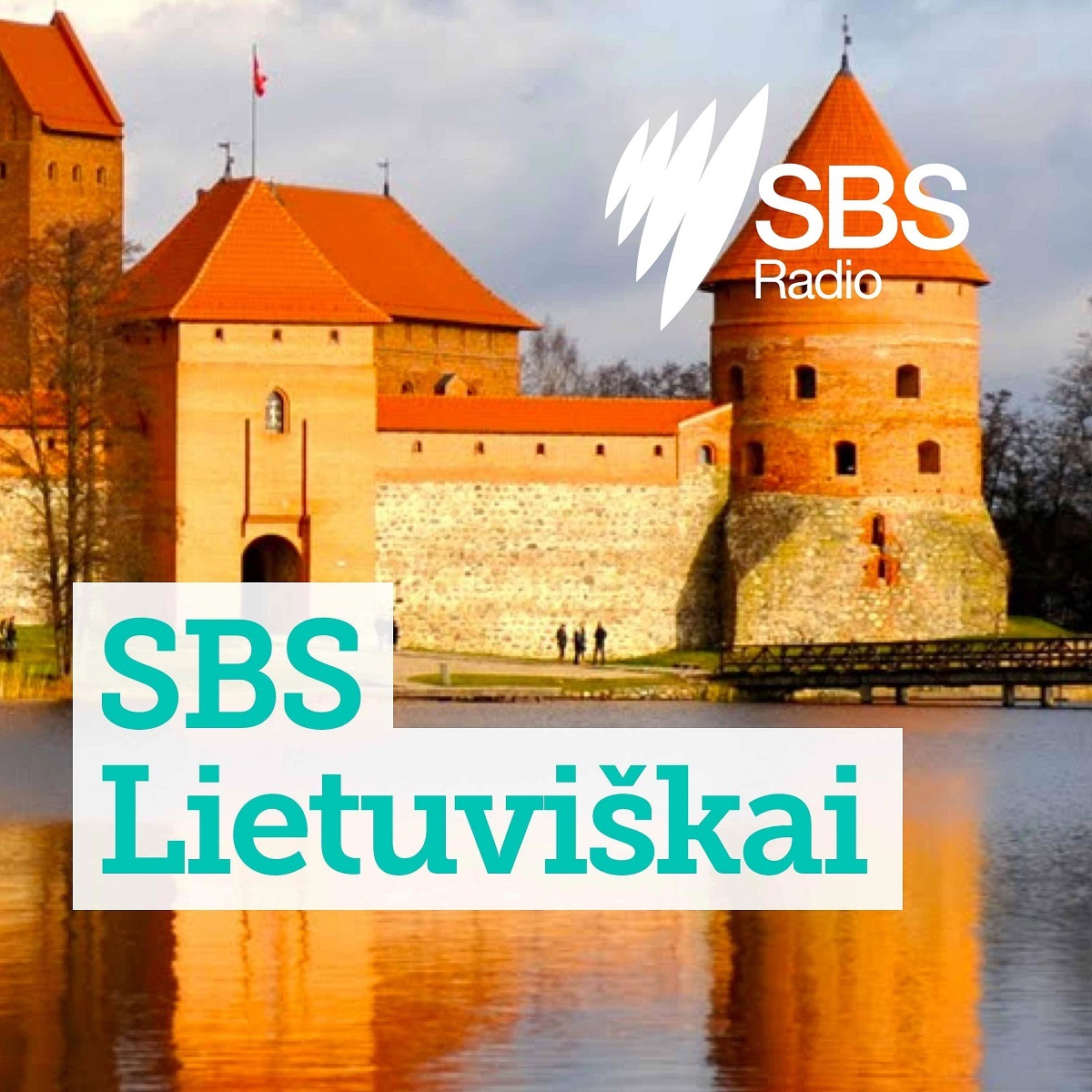
SBS Lithuanian Radio logo
Lithuanian Radio in Australia
Australia is one of the furthest countries inhabited by a fairly strong community of Lithuanians. The size of the country precluded the use of radio as a major media platform. Some radio broadcasting was attempted, but it was never as widely used as in the US.
One of the most prominent was a program in Melbourne. In 1974, Gabrielius Žemkalnis-Landsbergis and a number of Lithuanian colleagues began Lithuanian programming at the Melbourne radio station 3ZZ. Žemkalnis-Landsbergis was the first producer and host. In 1975 the program transferred to the SBS (Special Broadcasting Service) station, which also ran programs of other minority groups. Žemkalnis-Landsbergis continued to produce and host the Lithuanian broadcast from 1979 to1994.
SBS was an excellent choice, because it broadcast throughout Australia and also received some financial support from the government. The station was located in Sidney, but some of the staff were also located in other cities. Rymantė Gell worked in Sydney, Paulius Jokūbaitis – in Melbourne. According to the station’s website, after audience surveys performed in 2016-2017, the program was discontinued in early 2018 due to lack of listener response. The station’s website provides a sample of a Lithuanian program, with a summary of information from Lithuania. It seems that this section of the broadcast was taken from the Lithuanian National Radio.
At one time there was a program in the Djeelong area, the “Djeelong Lithuanian Radio Hour”, hosted by Irena Stumbrienė and Irta Valodkienė on Tuesdays from 8 to 9 PM Melbourne time on the 3YYR station, 94.7 MHz (FM). No information is available about that program, and very little about “Brisbane Lithuanian Radio”, which was run by Anna Augūnas, Joan Einikis and Evaldas Sagatys. -
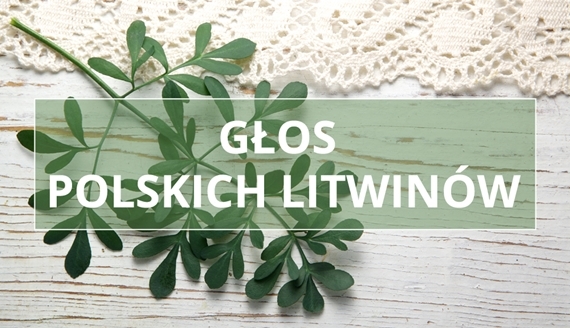
The conclusion of the Lithuanian program on Bialystok radio “Poland’s Lithuanians Speak” (Głos polskich Litwinów)
Lithuanian Broadcasting in Europe: Poland
After Lithuanian independence was restored, radio networks began broadcasting Lithuanian programs in Europe. Together with the traditional Voice of America, Rome Radio and Vatican Radio, Lithuanian programs arrived for Lithuanian communities in Poland and Lithuania.
In Poland, Lithuanian programming began in 1991. An active community had settled near the Lithuanian border. The Lithuanian program “Poland’s Lithuanians Speak” (Głos polskich Litwinów) was broadcast from Bialystok, for Lithuanians living in the area, from the Polish station Polskie Radio Białystok. Although all the information on the station’s website is only in Polish, the program is Lithuanian, and can be heard through the website.
The first program was heard on March 4, 1991. Currently it is on from 6:30 to 6:45 PM on Tuesdays and Thursdays, and Sundays from 7:30 to 8 AM in the Bialystok area. Hosts listed on the website are Rūta Burdyn, Robert Słowik, Zyta Wasiluk.
There was another Lithuanian radio program in Poland, not broadcast by the Polish Lithuanian Community but on the initiative of the Lithuanian contingent of Poland Radio’s management. The program was created to assist Lithuanian integration in Poland. The Lithuanian program “Program V” was broadcast from the station Poland Radio near Warsaw. It ran from July 1, 1991, to December 31, 2002, and could be heard in northern Poland and Lithuania. -
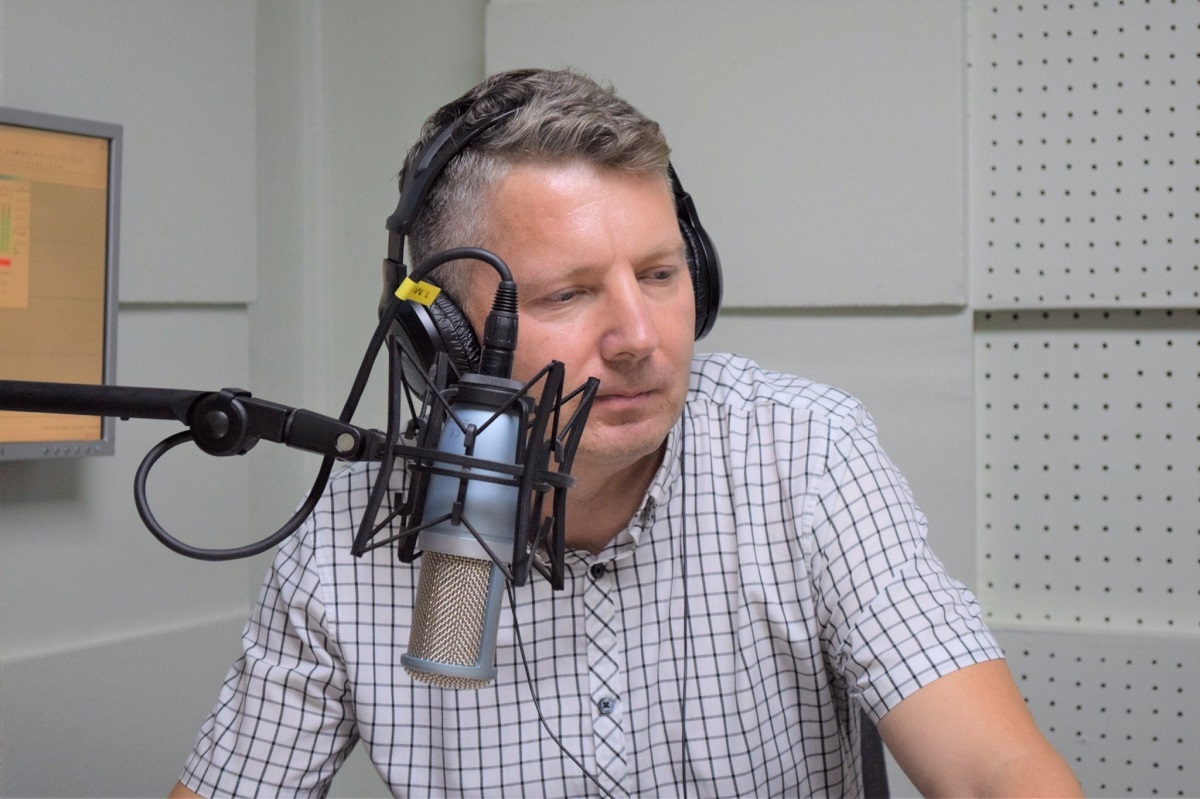
Host of the Latvian Lithuanian radio program “Beloved Lithuania” Rolandas Žalnierius, September, 2019
Lithuanian Broadcasting in Europe: Latvia
The Lithuanian program “Beloved Lithuania” broadcasts in Latvia, hosted by Rolandas Žalnierius, on the first Wednesday of the month from 6 PM to 7 PM, on bands 107.7 in Riga, 88.7 in Daugpilis, 97.9 in Liepoja. You may hear the programs on the following link, choosing Kultūras biedrību raidījumi.
“Beloved Lithuania” has been broadcast for a long time, however the original date of inception was not found. In about 2007, it was hosted by Vaidilutė Indrelienė, managed by Bronislavas Spridzanas. Listen to an introduction from an earlier show (2007) on the online radio archive. -
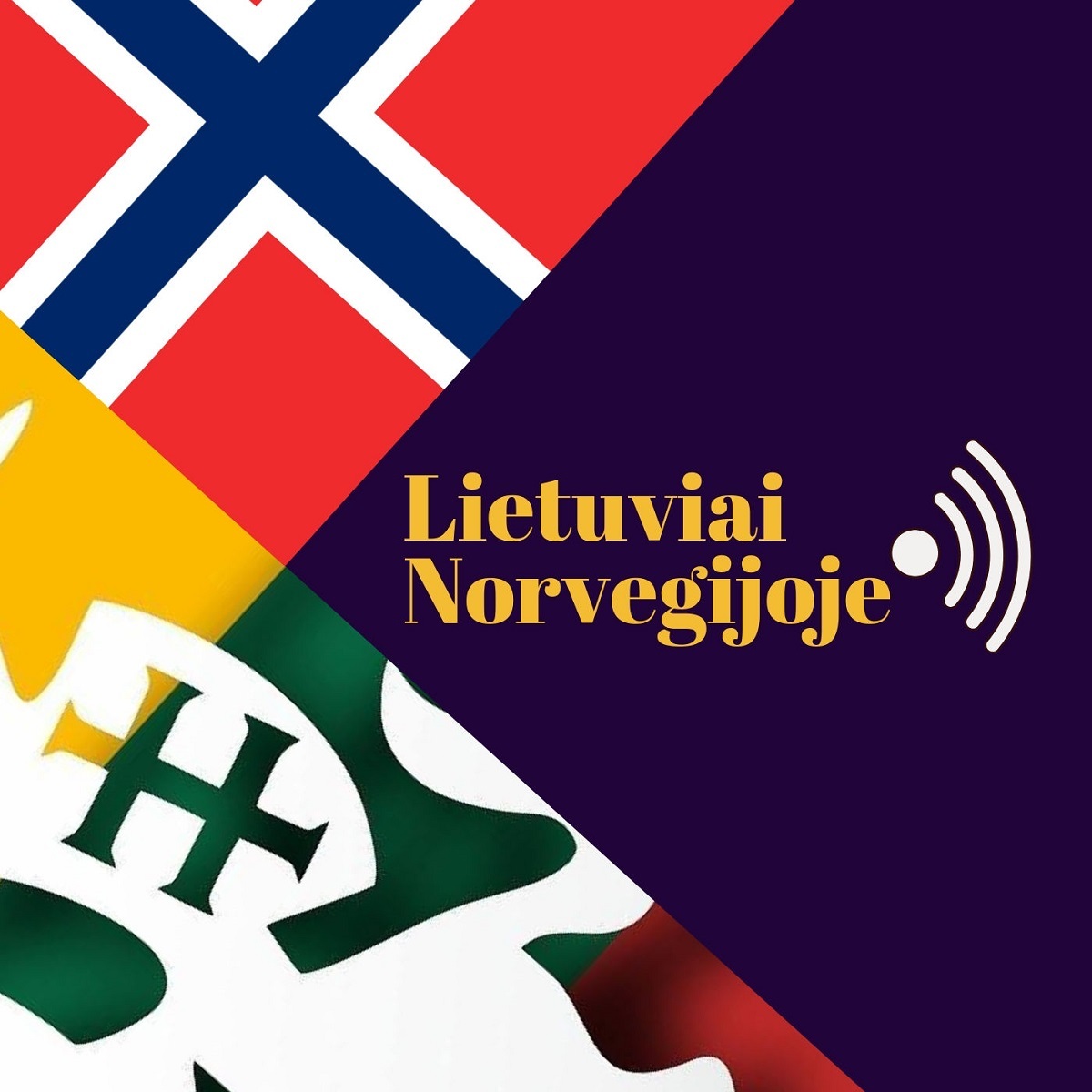
Podcast screensaver “Lithuanians in Norway”
“Lithuanians in Norway” Podcast
In the early 20th century, Lithuanians in the diaspora used all available media – radio and television – to communicate. Today an integral part of that function is the internet. Radio and other audio content also migrated to the internet, including filmed radio programming, YouTube streaming and the latest genre, podcasts. A podcast is a free media format allowing the presentation of audio and video recordings, interviews and information via online platforms with archives that are accessible at any time.Although the Argentinian program “Echoes of Lithuania” Ecos de Lituania) was the first to venture online, another worth mentioning is the podcast initiated by the Lithuanian Embassy in Norway, called “Lithuanians in Norway”.
The podcast has been streaming since April 17, 2019 on Spotify, YouTube, iTunes and Stitcher. During its first year over 60 episodes were created, with guest speakers, discussions on Lithuanian life, issues, events and news. The podcast is made up of two sections, a regular weekly newscast posted on Fridays, hosted by journalist Aistė Čiučiurkaitė. The second, with Simona Petrauskaitė hosting interviews and video reports on topics such as community life, are not produced regularly.
On Spotify the podcast is described as follows: “The Embassy of the Republic of Lithuania in the Kingdom of Norway presents the podcast ‘Lithuanians in Norway’, to encourage interaction and understanding among Lithuanians in various areas of Norway, and to strengthen ties between Lithuanians living in Norway and Lithuania. It is important to us that listeners get to know one another, hear success stories and other interesting reports, and receive news and advice on relevant topics. The podcast is meant for Lithuanians living abroad and in Lithuania. In the name of Lithuania!!!”
Listen to podcasts on:
YouTube
Spotify
iTunes -
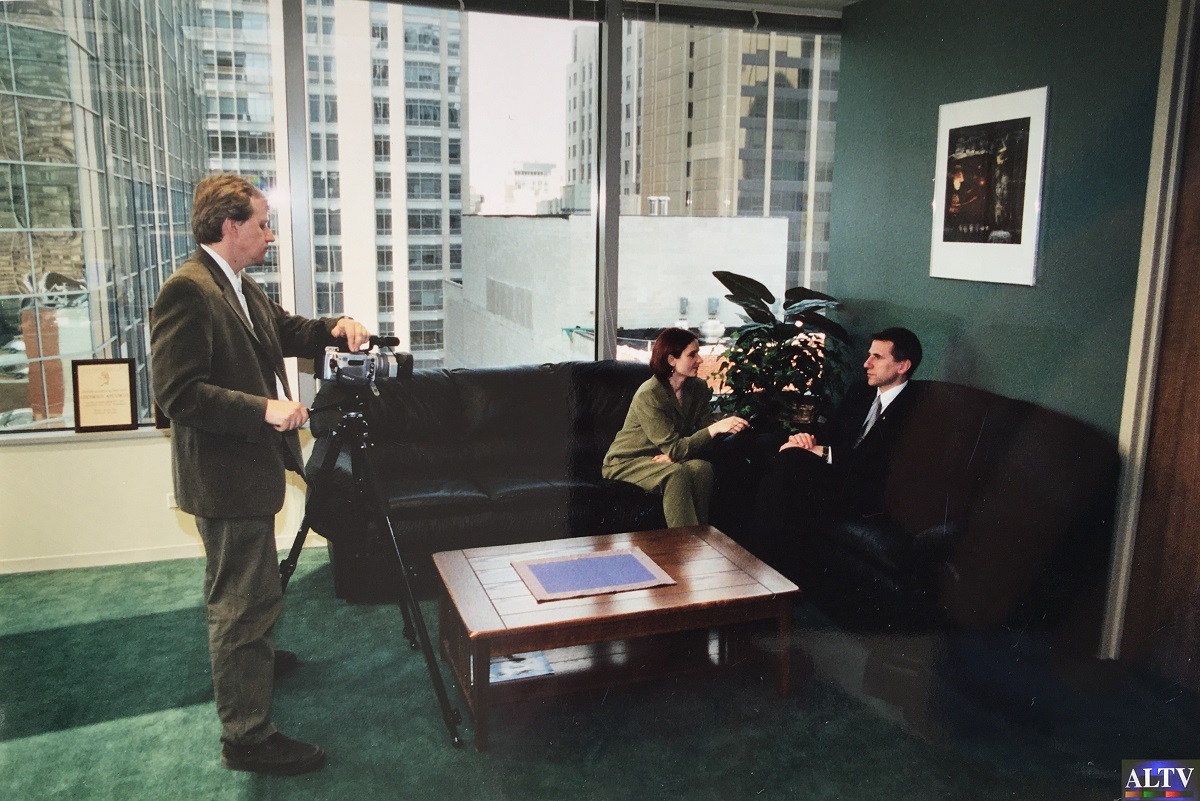
ALTV correspondents Karilė Vaitkutė and Arvydas Reneckis at the Lithuanian Consulate in Chicago with Ambassador Vygaudas Ušackas (Photo from A. Reneckis’ archives)
Lithuanian Television Broadcasts Abroad
The field of Lithuanian television in the diaspora was always modest, yet it was unique and important for the community. After 1990, Lithuanians had two broadcasts. American Lithuanian Television, or ALTV, was broadcast in Chicago, USA, from 1995 to 2001 on Channel 23, WFBT-TV. Program times changed – at first it was on Saturday mornings, later twice and even three times weekly. Planning began in 1994, and the first program was shown in 1995. The founders were Arvydas Reneckis, Karilė Vaitkutė and Algimantas Kezys. Throughout the years, Reneckis was the producer and host of the program, and was assisted by many local Lithuanians. More information about its history and various challenges he confronted is available in this interview with Reneckis.
The other television program is still broadcast from Lithuania’s neighbour Poland, in Bialystok. As early as 1995, there were references to a program called “About Ourselves” (Sami o sobie/Patys apie save), meant for the Belarusian, Ukrainian and Lithuanian communities living in Poland. No further information about this program was available. Beginning in 2003, TVP3 Białystok broadcast a Sunday program for Lithuanians, called “Lithuanian Panorama” (Panorama Litewska). It was barely 7 minutes and 30 seconds long, but it contained community news and information about events in Lithuania. Currently it is headed by Renata Jacewicz and her team, which includes Rūta Burdyn (Burdinaitė), Arkadiusz Wronowski, Michal Ras, Jolanta Mainowska-Wiaktor. Former assistants were Robertas Viktoras and Juzefas Vierška. “Lithuanian Panorama” can be seen on the television station’s website.
With technological improvements, Lithuanian national broadcasting has been reaching the diaspora since 2007. Transmitted by satellite television, programs can be viewed throughout the world, and are now available online.


